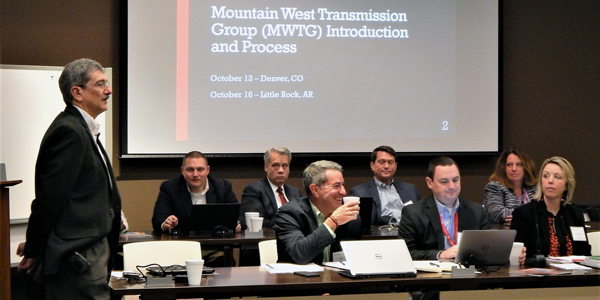By Tom Kleckner
LITTLE ROCK, Ark. — SPP began the public portion of integrating the Mountain West Transmission Group with a pair of lively stakeholder meetings Friday and Monday.
Representatives from the two entities shared details of SPP’s integration process, proposed modifications to the RTO’s governing documents and the integration’s timeline. The two meetings attracted about 325 current and potential SPP members, state regulators, and environmental and customer advocates in person or on the phone.
“This will start the debate process as we work together in a way that benefits both SPP and Mountain West,” SPP COO Carl Monroe said in kicking off the meeting at Mountain West member Tri-State Generation and Transmission’s offices in Westminster, Colo.
During a Monday meeting in Little Rock, SPP members peppered representatives with numerous questions about several of Mountain West’s proposals to modify the RTO’s stakeholder process.
The “Westsiders” have suggested:
- Creating a Westside Transmission Owners Committee with decision-making authority over issues reserved to the transmission owners;
- Prohibiting the SPP Board of Directors from changing decisions by the new committee, and replacing the board’s secret ballots with open ballots;
- Expanding the Regional State Committee’s authority to include resource adequacy and congestion rights allocation oversight for SPP’s Western Interconnection region, and giving Western members of the committee the right to direct the RTO to make FERC filings; and
- Adding seats on the board committees for Western representatives.
Kenna Hagan, senior manager of planning, policy and strategy for Black Hills Corp., said Mountain West’s proposals result from years of discussion among the coalition’s 10 utilities.
“This is a compromise position that’s taken us three years to derive,” Hagan said. “There’s strong interplay between each of those items we’re proposing. It’s not all or nothing … but it’s important to us to move forward as a group.”
Duke-American Transmission Co.’s Bob Burner called Mountain West’s suggestions “protectionist proposals,” saying, “It certainly discourages independent transmission developers from looking at anything on the west side.”
Other stakeholders questioned the differences between east and west in transmission cost allocations and rate design, but those involved in the negotiations worked hard to allay concerns.
“These are not meant to be two separate processes,” said Tri-State’s Mary Ann Zehr. “They’re supposed to work in concert with each other.”
“You’re bringing up things we will have to address [in the stakeholder process] and work through,” said SPP Associated General Counsel Mike Riley.
SPP and Mountain West are in the third stage of the RTO’s process for integrating new members, when staff will convene special all-member and stakeholder meetings to discuss proposed document changes. Mountain West triggered the stage when it said in September it had completed initial discussions with the RTO’s management team and would begin public negotiations. (See Mountain West to Step up Talks with SPP on Joining RTO.) Mountain West, which primarily services Colorado, Wyoming and Nebraska, announced its intentions in January to join SPP. The two entities are working on an Oct. 1, 2019, target date for membership.
SPP’s existing members will see a phased-in, reduced administrative fee. The fee, currently 48 cents/MWh, will drop to 43 cents for 2020, resulting in annual savings to existing members of $16 million to $25 million for the first three years and a total net present value benefit of approximately $209 million for the first 10 years of Mountain West membership, SPP said.
A Brattle Group study conducted for Mountain West found the entity could save $53 million to $71 million annually through 2024 by participating in a day-ahead market and replacing its nine tariffs with one. A separate Glarus Group study of DC tie flows in a combined Mountain West-SPP market showed “significant” benefits, with annual net production cost savings ranging from $11.7 million to $28.8 million.
Any changes to SPP’s governing documents will be reviewed by stakeholders on the Corporate Governance Committee (governing documents), Strategic Planning Committee (negotiating strategies, new member deliberations), Markets and Operations Policy Committee (Tariff revisions) and the RSC (state regulatory agency input).
SPP’s board will have the final call on any changes.
SPP will conduct a reliability assessment of each incoming member’s transmission system to ensure they meet the minimum reliability planning criteria. Staff performed similar assessments when it added Nebraska’s utilities and the Integrated System.
“We’ve been through this before,” said Lanny Nickell, SPP vice president of engineering.









